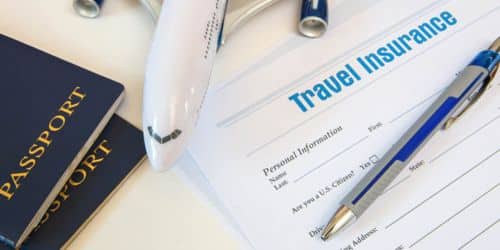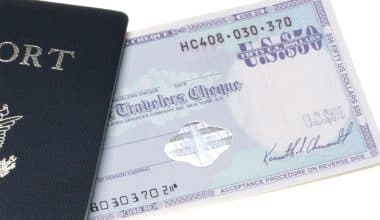According to Forbes Advisor’s review of travel insurance rates, the average cost of travel insurance is 5% to 6% of your trip spending. The average travel insurance cost for a $5,000 trip is $228, with rates ranging from $154 for a basic policy to $437 for a policy with broad coverage.
The cost of your vacation has a huge impact on how much travel insurance costs. Businessyield examined quotes for 23 different travel insurance policies to estimate average rates according to trip expenditures, ages, and the number of travelers. We also compared the average rates of 16 travel insurance policies with and without “cancel for any reason” (CFAR) coverage.
How Much Does Travel Insurance Cost?
According to Squaremouth, a travel insurance comparison site, a comprehensive travel insurance policy with trip cancellation coverage will cost you 5% to 10% of your total trip cost. Squaremouth also discovered that in the previous year, passengers spent an average of $295 on travel insurance for a 16-day trip. However, the cost of your travel insurance will vary depending on a variety of criteria.
The Average Cost of Travel Insurance by Location
The table below shows that international trips are slightly more expensive than domestic trips. As a result, if you travel abroad, you can expect to pay higher premiums. Regardless, of whether you’re traveling in the United States or another country, travel insurance is essential.
“Anyone traveling domestically or internationally will benefit from travel insurance because it can cover unexpected events that result in medical emergencies, cancellations, or interruptions – all of which are important given the current airline and airport staffing shortages occurring worldwide,” says Jeff Rolander, VP of claims at Faye Travel Insurance.
| Destination | Average Trip Cost | Average Trip Insurance Cost |
| Domestic | $4,207.09 | $210-$421 |
| International | $4,441.13 | $222-$444 |
Domestic travel, as shown in the table below, does not necessarily result in lower travel insurance costs. travels to Mexico, for example, are less expensive to insure than travels to the United States.
| Destination | Average Trip Cost | Average Trip Insurance Cost |
| United States | $4,207 | $210-$421 |
| Italy | $5,896 | $295-$590 |
| France | $4,755 | $238-$476 |
| Spain | $4,293 | $215-$429 |
| Great Britain (UK) | $4,249 | $212-$425 |
| Germany | $4,214 | $211-$421 |
| United Kingdom | $4,102 | $205-$410 |
| Israel | $3,218 | $161-$322 |
| Canada | $3,154 | $158-$315 |
| Mexico | $2,668 | $133-$267 |
Costs of Average Travel Insurance for “Cancel for Any Reason” Coverage
Comprehensive travel insurance policies include trip cancellation insurance. If you cancel your trip for one of the reasons specified in the policy, it will reimburse you for 100% of the non-refundable money you lost.
If you’re concerned that you might need to cancel your trip for a reason not covered by the policy, “cancel for any reason” (CFAR) coverage can be a lifeline.
“Cancel for any reason” coverage is an add-on that allows you to receive a partial refund (usually 50% or 75% of your prepaid trip costs) regardless of the reason for the cancellation.
According to our survey of 16 policies, the average cost of a policy without CFAR is $225 and a travel plan with CFAR is $337, a $112 difference.
CFAR raises the cost of a travel insurance package by 50% on average.
Read Also: AVERAGE CAR INSURANCE COST: Detailed 2023 Guide
| Travel insurance plan | Travel insurance cost without CFAR | Travel insurance cost with CFAR | $ difference with CFAR | % increase by adding CFAR |
| John Hancock Insurance Agency Bronze | $173 | $260 | $87 | 50% |
| GoReady Pandemic Plus | $174 | $261 | $87 | 50% |
| Tin Leg Gold | $191 | $287 | $96 | 50% |
| John Hancock Insurance Agency Silver | $194 | $291 | $97 | 50% |
| USI Affinity Ruby | $195 | $293 | $98 | 50% |
| Travelex Travel Select | $208 | $291 | $83 | 40% |
| Seven Corners RoundTrip Choice | $209 | $297 | $88 | 42% |
| Trawick Safe Travels Voyager | $222 | $377 | $155 | 70% |
| Tin Leg Luxury | $222 | $311 | $89 | 40% |
| HTH Travel TripProtector Preferred | $232 | $348 | $116 | 50% |
| USI Affinity Diamond | $238 | $369 | $131 | 55% |
| Travel Insured International Worldwide Trip Protector | $246 | $354 | $108 | 44% |
| Tin Leg Adventure | $252 | $341 | $89 | 35% |
| TravelSafe Classic | $265 | $496 | $231 | 87% |
| John Hancock Insurance Agency Gold | $274 | $411 | $137 | 50% |
| Berkshire Hathaway LuxuryCare | $298 | $411 | $113 | 38% |
The cost of “cancel for any reason” insurance is determined by your needs and risk tolerance. Consider adding CFAR to your plan if you want the freedom to cancel your trip because you changed your mind and don’t want to travel, but you still want some recompense.
Factors Influencing the Cost of Travel Insurance
The factors that influence travel insurance costs differ based on the insurer and policy you select. Some travel insurance providers, for example, do not consider your destination when calculating prices, whilst others do. Some of the most regularly utilized inputs in determining travel insurance prices are as follows:
#1. Trip costs and policy restrictions
When deciding on the limits of your travel insurance policy, consider all of the costs of your vacation, from flights to booked activities. One of the most important elements influencing your travel insurance prices is the total trip cost and your policy sub-limits, which determine the maximum payout in the event of a claim.
#2. Coverage types include
A travel insurance policy can be highly specific or very wide, so examine the risks involved in your trip and select the suitable combination of coverages. The cost of a policy will rise when you expand the scenarios in which you’re covered, such as adding hazardous sports coverage or reasons you might be reimbursed.
#3. Deductible
Choosing a higher deductible coverage will result in lower travel insurance prices because you will pay a greater amount out of pocket if you submit a claim.
#4. Age and number of travelers
Older travelers, particularly those over the age of 50, are more likely to file a claim since they are more likely to become ill or injured.
#5. Trip length
Longer journeys frequently have higher travel insurance costs because there is more potential for a loss.
#6. Destinations
If you travel to areas with greater healthcare costs, the cost of your travel insurance may rise. Furthermore, some sites will be more expensive to coordinate emergency transportation from, therefore insurance with greater limits may be required to pay for this.
Travelers’ health If you have pre-existing conditions, you will usually be charged a premium cost for the insurance that will cover difficulties related to those conditions, or you will have coverage exclusions.
How to Reduce Travel Insurance Costs
#1. Don’t pay for coverage that you don’t require
Examine your credit card, health insurance, house insurance, and, in some situations, car insurance coverage, and try to find a policy that fills in the gaps.
#2. Examine premiums from several companies
While the cheapest plan isn’t always the greatest, some firms may provide lower prices for the same coverage than others. Some companies, for example, are more economical to elderly visitors. It’s a good idea to shop around for the coverage you require.
#3. Consider the following annual plan
If you travel regularly, having an annual plan may save you money. However, you should examine the benefits of each plan to ensure you’re receiving the most bang for your buck as compared to a trip-based plan. Remember that annual plans may not be offered in all states.
#4. If possible, avoid canceling coverage for whatever reason
You may believe that cancel-for-any-reason coverage will put your mind at ease, but these policies are often much more expensive and frequently give poorer coverage. You should avoid this type of coverage unless it is absolutely necessary for your vacation.
How to Select the Most Appropriate Travel Insurance
#1. Determine which types of coverage are important to you.
Travel insurance is a collection of coverages that may or may not include the following:
- Travel cancellation and interruption: Provides payment if your vacation is canceled or interrupted due to unforeseen circumstances such as injury or natural disaster.
- Travel medical insurance: Provides temporary health insurance in the event that you become ill or injured while traveling. If required, it pays to have you evacuated to the nearest competent medical facility.
- Accidental death and dismemberment: Provides a lump amount to you if you lose a limb in an accident, or to your beneficiaries if you die in an accident.
- Baggage loss or damage: Provides reimbursement for lost or damaged baggage and personal possessions.
- Cancel-for-any-reason coverage: Allows you to cancel for any reason and obtain a partial refund, although it is more expensive.
Extras such as vehicle rental coverage, luggage delay, pet medical care, and missing connection coverage may be included in some travel insurance packages. The majority of travel insurance policies include some type of travel support. Before obtaining a travel insurance plan, decide which coverages you want, then check to see what is currently covered by your credit card and existing insurance policies.
#2. Examine Company Ratings
When comparing providers, you should evaluate more than simply the cost of the policy and the coverage provided. Check that the insurer has an A- (Excellent) financial strength rating from AM Best, and consider customer reviews from third-party sites such as TrustPilot, ConsumerAffairs, and the BBB.
#3. Compare Premiums
Some travel insurance companies may give a lower price than others based on your age and trip expense. That is why it is critical to compare quotes. You can obtain estimates directly from the websites of each insurance company, or you can utilize an insurance aggregator site, which allows you to browse prices from a number of businesses with a single application.
#4. Examine the policy’s exclusions and limitations.
Examine the policy information and compare limits and exclusions while comparing premiums. Some insurance companies, for example, will not compensate you if your trip is delayed, and others may deny coverage for pre-existing conditions. Furthermore, medical coverage may exclude injuries sustained while participating in certain hobbies, such as scuba diving.
#5. Examine Endorsements
Some insurers provide typically omitted coverages as add-ons to your travel insurance policy for an additional fee or as a feature included in certain packages. If you want to add an extra layer of security, look into what’s available. While most travel insurance policies exclude pandemics and epidemics, most Allianz policies include an epidemic coverage endorsement that will cover cancellation, interruption, medical care, and other expenses in the event of a COVID-19 diagnosis.
#6. Purchase as soon as possible
To obtain coverage for pre-existing conditions, you must normally purchase travel insurance shortly after purchasing your trip or paying a deposit on it. Furthermore, travel insurance normally only covers unforeseeable occurrences, so if you wait until a weather event is disclosed before purchasing coverage, that weather event may not be covered. The sooner you purchase travel insurance after booking your trip, the fewer exclusions you’ll have to deal with.
What Does Travel Insurance Typically Cover?
Trip cancellation, interruptions, delays, baggage loss, medical bills, emergency medical evacuation, and accidental death and dismemberment are all covered by travel insurance. You can also choose add-ons to enhance your coverage. Who is the finest business to get travel insurance from?
In our review of the best travel insurance carriers, we discovered that Nationwide provided the best overall travel insurance, with AXA Assistance USA coming in second.
Is It Worthwhile to Purchase Travel Insurance?
If you’re worried about losing money on non-refundable payments and deposits if something goes wrong before or during your trip, travel insurance is usually well worth the cost. The more money you stand to lose, the more crucial trip insurance becomes.
Travel insurance quotations are completely free. You can compare prices to see if travel insurance is worth the cost in your particular scenario. Include advantages such as travel medical insurance and “cancel for any reason” coverage in the plan. With estimates in hand, you can measure the benefits of getting travel insurance against the money you could lose if you don’t have it.
Do Travel Insurance Policies Include COVID?
Many travel insurance policies cover Covid for trip cancellation as well as medical expenses. However, not all do, so make sure your plan includes Covid coverage. See our recommendations for the best Covid-19 travel insurance policies.
Summary
Purchase travel insurance if you are doubtful about your vacation or are concerned about incurring bills you cannot afford. Before purchasing a policy, you should consider the sort of insurance you want to get; certain types of coverage are much more expensive than others.
You could also check to see if your credit card already includes free travel insurance. This option is available on many popular travel cards, albeit the restrictions may be lower than you would desire.
Finally, before purchasing insurance, do your research. Before making a selection, get quotes from several firms, and keep in mind that the typical cost of trip insurance ranges from 4% to 8% of your overall vacation spending.
Related Articles
- IS TRIP INSURANCE WORTH IT? All You Need To Know
- TRAVEL COMPANIES: 11+ Best Travel Companies 2023
- WHAT IS INSURANCE: Definition, How It Works, & Policy Types
- BIGGEST INSURANCE COMPANIES IN 2023: Top Companies in the World, Us, UK & Canada
- COMMERCIAL INSURANCE BROKERS: Top Best Insurance Broker & Salaries






